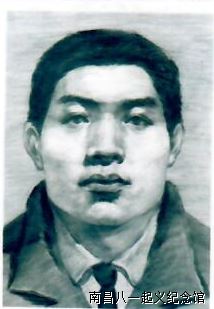A 90-Year Journey: A Delayed Acknowledgment
Release time:
2020-08-17
On August 1, 1927, more than 20,000 soldiers of the uprising, holding the belief and responsibility that every individual has a duty to the rise and fall of the nation, rushed to the battlefield to fight for the people. They fired the first shot in Nanchang against the reactionary Kuomintang, announcing the great beginning of the Chinese Communist Party's independent leadership in revolutionary armed struggle and the establishment of a new type of people's army. Today, let us listen to the story of Gu Jinren, a participant in the Nanchang Uprising.
On August 1, 1927, more than 20,000 soldiers of the uprising, embracing the belief and responsibility that every individual has a duty to the rise and fall of the nation, rushed to the battlefield for the people's struggle, firing the first shot of armed resistance against the reactionary Kuomintang in Nanchang, announcing the great beginning of the Communist Party of China independently leading the revolutionary armed struggle and creating a new type of people's army.
Today, let us listen together.
The story of Gu Jinren, a participant in the Nanchang Uprising.
Delayed Recognition
Narrator:
Zhao Fengyu, Zhao Fengzhu, Zhao Fengzhen

Gu Jinren
In 1906, our grandfather Gu Jinren was born into the family of a wealthy landlord, Gu Shiqing, in Xitangqiao, Changshu County, Jiangsu Province (now Tangqiao Town, Zhangjiagang City). He studied at Changshu Third High School from a young age, and he did not have the vulgarity of a rich family's spoiled child from the old society; he never bullied the weak, but often used his pocket money to buy stationery for poor students, and his classmates all liked to be friends with him.
At a young age, he had a sense of justice, was upright and unyielding, and often expressed indignation at unreasonable social phenomena. He frequently asked adults, "Why are the hardworking families poor, while those who do not work are rich?" "Why do the rich bully others, while the poor are bullied?"
In 1925, while studying at Pudong Middle School in Shanghai, he joined the Communist Party of China and embarked on the revolutionary path. Subsequently, he was arranged by the Shanghai Jiangsu-Zhejiang District Committee to return to Changshu to lead mass movements, trade union work, student work, and peasant work.
In the autumn of 1926, he carried out revolutionary activities in his hometown, promoting the slogan "Down with the local tyrants and evil gentry" and implementing "Land to the tiller." He repeatedly urged his father to publicly burn the rent collection books and land contracts. When tenant farmer Ma Quan came to pay rent, he told him to take the rent rice back and advised him never to come to pay rent again. His great-grandfather was furious and scolded him as a "rebellious son," "fool," and "wasteful son." Gu Jinren did not back down and argued logically, leaving his great-grandfather speechless, who could only threaten to sever ties with him. Gu Jinren publicly raised the slogan "Down with the big landlord Gu Shiqing" among the farmers and organized the masses to go to his house to confront Gu Shiqing. Under his promotion, the peasant movement in the Tangqiao area rapidly developed.
In May and June 1927, Gu Jinren obeyed the arrangements of the higher party organization and left his hometown for Wuhan. In early July of the same year, under the direct arrangement of the central government, he went to work in He Long's army and participated in the August 1 Nanchang Uprising on August 1. During the southward march of the uprising troops, he lost contact with the army and returned to Tangqiao to carry out the tasks assigned by the higher party organization. However, due to injuries and prolonged overwork, he fell ill in Tangqiao and unfortunately passed away in January 1928 at the age of 22.
The "Selected Revolutionary Martyrs of Zhangjiagang City" compiled by the Zhangjiagang Municipal Party History Office and the Zhangjiagang Municipal CPPCC Literature and History Data Committee records on page 22: "After Gu Jinren's death, the Changshu Public Security Bureau suspected foul play and sent personnel to the Gu family to open the coffin for an autopsy, but later learned that he had indeed died, and then returned happily." This shows how much the reactionary forces feared and hated Gu Jinren at that time!
On July 22, 1985, General Zhou Wen, a participant in the Nanchang Uprising, personally wrote historical proof materials titled "Remembering Comrade Gu Jinren": "Comrade Gu Jinren was young, active, determined, and capable... Comrade Gu Jinren sacrificed his life for the revolutionary cause, enduring hardships and fighting hard, which is beyond doubt!"
On August 16, 1987, exactly 59 years after our grandfather Gu Jinren's death, the Zhangjiagang Civil Affairs Bureau issued a red-headed document, Zhang Zhengmin [1987] No. 66, "Report on the Recognition of Comrade Gu Jinren as a Revolutionary Martyr." The report clearly stated: "Comrade Gu Jinren indeed worked hard for the revolutionary cause, suffered from illness due to overwork, and sacrificed his life for the revolutionary cause."
On August 1, 2020, after verification by the staff of the Nanchang August 1 Uprising Memorial Hall, Gu Jinren's name returned to the place where the August 1 military flag was raised. Gu Jinren was one of the witnesses of the Nanchang Uprising and also one of the participants in the Chinese revolution. Gu Jinren's contributions to the Chinese revolution will be forever recorded in history!
recommend News
Copyright 2021 Nanchang August 1st Uprising Memorial Hall All Rights Reserved |Bayi Pavilion WeiboWebsite construction:www.300.cn



